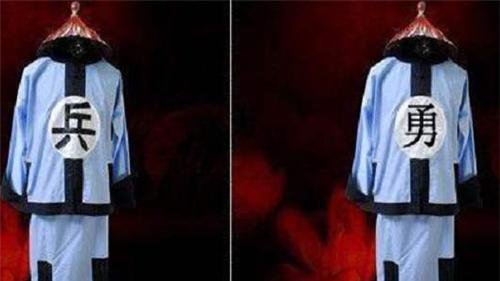Because of the large number of Qing palace dramas, everyone is familiar with many things in the Qing Dynasty, but many things just look familiar, if you really want to talk about the doorway inside, you may not be able to say it!
For example, we know that the uniforms of the Qing soldiers are all the same: with a pointed hat, with this long braid, with a knife, with a spear, but they all have a word on them, have you noticed? Some people may say that it is a "soldier", and some people will say that it is a "brave" word, but in fact, there are two words, and the two words represent two different identities. And our TV series often use these two words incorrectly.

It turned out that the military system of the Qing Dynasty was originally eight flags and green camps that complemented each other. The Eight Banners are the most elite Manchu soldiers at the beginning of the Qing Army, most of them are good at riding and shooting, not afraid of death and have rich battlefield experience, but the Manchus as a small nation, relying on his Manchu soldiers to unify China can not be completed, so the later Qing Dynasty leaders creatively came up with the concepts of "Mongolian Eight Banners" and "Han Eight Banners", which are equivalent to the previous Eight Banners becoming 24 Banners.
However, the Eight Banner Soldiers who entered the Central Plains quickly became corrupt and could not undertake the task of fighting against the remnants of the Southern Ming Dynasty to unify China, so they absorbed a large number of Ming Dynasty soldiers at that time to form a new structure called the Green Battalion, and the Eight Banners and the Green Battalion assisted each other, and finally unified China.
Whether it is the Eight Banner Soldiers or the Green Battalion Soldiers, they all belong to the official army of the Qing Dynasty, they are all lifelong, they can enjoy the welfare benefits given to them by the Qing Dynasty for a lifetime, and they are a rentier class with "iron crops" and no worries about eating and drinking. They all had a big "soldier" written on their bodies.
It is precisely because the treatment given to the Eight Flags and the Green Battalion is too good, and they can also live an enviable life without military merit by salary and power.
Their combat effectiveness declined rapidly, and when the Taiping Rebellion came, those Eight Banner Soldiers and Green Battalion soldiers who were usually pampered and even smoked a lot of cigarettes had almost no strength to fight back against the hard-working Taiping Army who were born of peasants and miners, and most of the Great Qing Kingdom was almost occupied by the Taiping Heavenly Kingdom at once.
In this critical situation, the imperial family, who hoped to save the fate of the Qing Dynasty, and Zeng Guofan, a Han scholar who wanted to show his talent and build merit, reached a consensus - to recruit regimental exercises. Tuan Lian was more like a kind of personal soldier of Zeng Guofan, but only nominally gained the approval of the imperial court. This is another kind of soldier of the Qing Dynasty, called "Yong."
"Yong" was the most important fighting force in the late Qing Dynasty, but their status was far inferior to that of those "soldiers" who smoked big cigarettes and visited kilns. "Yong" are all temporarily recruited soldiers, according to our current words, they are a part-time worker, and when the work is done, people will leave and make a living for themselves.
Although the treatment of "brave" is not as good as that of "soldiers", the combat effectiveness of "brave" is much greater than that of "soldiers", because most of them are peasants, miners, and unemployed people who are born relatively ordinary, can afford to suffer hardships, and are not afraid of death.
But it is precisely because most of these "brave" people live in poverty, in order to be able to make themselves or their families live better, they are often more able to fight than the well-paid Eight Banner Soldiers and Green Battalion soldiers, such as the Xiang Army that wiped out the main force of the Taiping Heavenly Kingdom in the back - they are all "brave".
The emergence of these "brave" also gave many scholars the opportunity, if you have the ability, you can recruit soldiers to become a warlord and become your own emperor. For example, Yuan Shikai, who trained the new army between Tianjin and Tanggu - of course, the new army at this time may no longer have a "yong" word, but they are similar in nature to "yong", they are not soldiers within the scope of the Eight Banners and the Green Battalion.
Because they were directly led by Yuan Shikai, their salaries were paid by Yuan Shikai, their food was provided by Yuan Shikai, and their political and ideological work was also done by Yuan Shikai himself--regardless of whether the imperial court behind them contributed or not, the new army only had Yuan Shikai in the eyes of yuan shikai and no court. They only shed blood for Yuan Shikai, and looked more like mercenaries and private soldiers.
The difference between "soldier" and "brave" is one word, but the gap between the two is too large! The final historical ending was also completely different, the "soldiers" basically disappeared into the stage of history in the end, while many "brave" people changed their appearance, became part of the revolutionary party, and joined another round of historical waves.